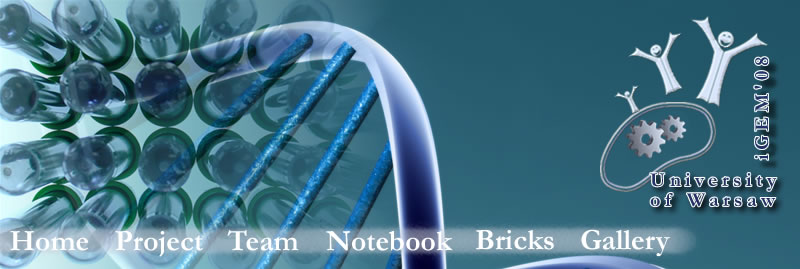Wiki/Team:Warsaw/protocols
From 2008.igem.org
 |
|
|
Culture E. coli producer strain in 3 ml of liquid LB medium + kanamycin for 8 hours. Then use it to inoculate 200 ml of liquid LB medium + kanamycin supplemented with 0,5 mM IPTG and grow it overnight. In the morning spin down the culture (5000 RPM, 10 min, 4°C). Resuspend the pellet in PBS buffer and disrupt cells by sonication. Spin down sonication mixture (13200 RPM, 10 min, 4°C) and discard supernatant – purified protein is present in sonication debris. Resuspend it in sterile ice cold ddH2O and store at 4°C. Purification of His_A_alphaCulture, induce and disrupt E. coli in the same way as to purify His_Z_alpha. The protein is present in supernatant (about 10% of total protein) and can be added to selection medium without further purification. Nevertheless we purified it to determine how much exactly should be added:
Mieżenie stężenia białkametodą BCA 1. do kuwetek dodano po 10 mikrolitrów preparatu, a do kontroli 10 mikrolitrów rostworu w jakim jest preparat 2. zmieszano BCA (pełna nazwa?) z CuSO4 (stężenie?) w stosunku 50 do 1 3. dodano 1.99 ml tego roztworu do kuwetek 3. inkubowano 30 min w 37 stopniach C 4. mieżono absorbancję przy długości fali? 5. stęzenie bialka odczytywano z krzywej wzorcowej Plasmid DNA isolationWe use "Plasmid Mini" plasmid DNA isolation kit from A&A Biotechnology and follow the protocol of producer. DNA isolation from agarose gelWe use "Gel-Out" DNA isolation kit from A&A Biotechnology and follow the protocol of producer. DNA purification after enzymatic reactionWe use "Clean-Up" DNA purification kit from A&A Biotechnology and follow the protocol of producer. Genomic DNA isolationWe use "Genomic-Mini" universal genomic DNA isolation kit from A&A Biotechnology and follow the protocol of producer. trawienianajczęstrze trawienia:
bamHi SacI
ndei saci
kpni psti - Bam buffer
bamhi psti - Bam buffer
xbaI psti
ecori spei
p>
Keep the bacteria on ice during the procedure. Pour ca. 25 ml of bacteria into a falcon tube and spin in 4°C at 4 krpm, 8 min with prolonged acceleration and deceleration. Remove supernatant. The pellet mustn't run dry. You can pour another portion of bacteria onto it and spin again. After desired amount of bacteria in pellet is collected, add CaCl2 in an amount of 10% of initial culture used for spinning. Suspend the pellet until no debris is visible on the bottom. Incubate 45 min on ice. Then spin 8 min at 4 kg and remove supernatant. Suspend the pellet in 3 ml CaCl2 and divide into aliquots of 100 μl. Preparation of electrocompetent bacteria
Electrotransformation
ChemotransformationAdd desired volume of DNA to the 100 μl. culture in eppendorf tube. Incubate 30 min on ice. Heat shock for 90 s at 42°C. Incubate 10 min on ice. Add 0.9 ml of culture medium and let the bacteria grow at 37°C. LigationWe use the following mixture:
|
 "
"